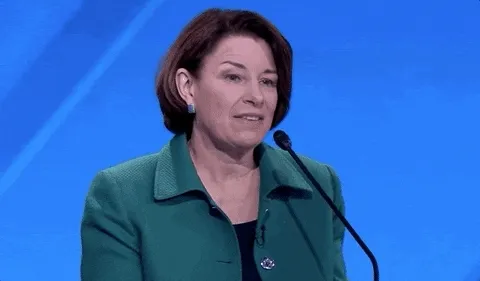Nearly one-half of high-income earners have considered ‘climate quitting,’ Deloitte report finds
Employers should communicate how they’re taking action on the climate crisis, one chief sustainability officer says.

The Democratic Debate/ABC News via Giphy
• 3 min read
Kristen Parisi is a senior reporter for HR Brew covering DEI.
The climate crisis is undeniable. Just this summer, the US saw its deadliest wildfire in a century in Hawaii, Southern California was hit by a tropical storm with record rainfall, and Phoenix, Arizona, had temperatures over 100 degrees Fahrenheit for 31 consecutive days. Oh, and July was the hottest month on record worldwide—we seem to be getting closer every day to The Day After Tomorrow.
Now, as some people (notably Gen Z) get more serious about how their actions impact the environment, it’s becoming increasingly important that employers incorporate sustainability into employee engagement efforts. Deloitte Global Chief Sustainability Officer Kathy Alsegaf recently told HR Brew how the company is communicating with its employees for a more sustainable future.
Are employers addressing climate enough? Nearly one-half (46%) of self-assessed higher-income workers have “considered switching jobs to work for a more sustainable company,” Deloitte found in a July report examining responses from people across 20 countries. The company refers to this as “climate quitting,” which may be a luxury afforded to those who identify as high earners. Though they may not have the means to quit their jobs, 77% of low-income workers report that employers aren’t doing enough for sustainability.
Even if a company is engaged in sustainability practices, companies should communicate this to their employees, Deloitte suggests. The report also pointed to internal research that found employers are more likely to increase their sustainability efforts when employees are more vocal about it, suggesting a cyclical effect.
Quick-to-read HR news & insights
From recruiting and retention to company culture and the latest in HR tech, HR Brew delivers up-to-date industry news and tips to help HR pros stay nimble in today’s fast-changing business environment.
Involve and educate employees. Communicating and involving employees in sustainability efforts requires a multi-pronged approach, Alsegaf told HR Brew.
She said it starts with teaching employees how they can lead more sustainable lives. That’s why Deloitte rolled out a sustainability learning program in fall 2022 that’s available to all employees virtually or through Deloitte University. The company’s universal climate learning is also incorporated into new employee training. So far, Alesgaf said 385,000 of Deloitte’s 400,000+ global employees have taken the training.
The company also hosts a Global Sustainability and Climate Learning week, during which employees can participate in live and on-demand sessions meant to motivate employees to make more sustainable choices.
Alsegaf recommended that HR leaders consider benefits that would help employees of all incomes lead more sustainable lifestyles, such as public transportation benefits, or wellness stipends to buy a bike or put toward composting. “What can both help the planet and demonstrate to the employee what the company is doing?” she said.
Furthermore, companies should communicate what they’re doing at a macro level to reduce their carbon emissions, according to Alsegaf. “We tell our story through our global impact report where we report against our positions and where we are on the journey,” she explained. However, sustainability messaging is also weaved into employee websites and social media. “You have to keep telling the story and finding what’s going to resonate with your audience,” she said.
Quick-to-read HR news & insights
From recruiting and retention to company culture and the latest in HR tech, HR Brew delivers up-to-date industry news and tips to help HR pros stay nimble in today’s fast-changing business environment.